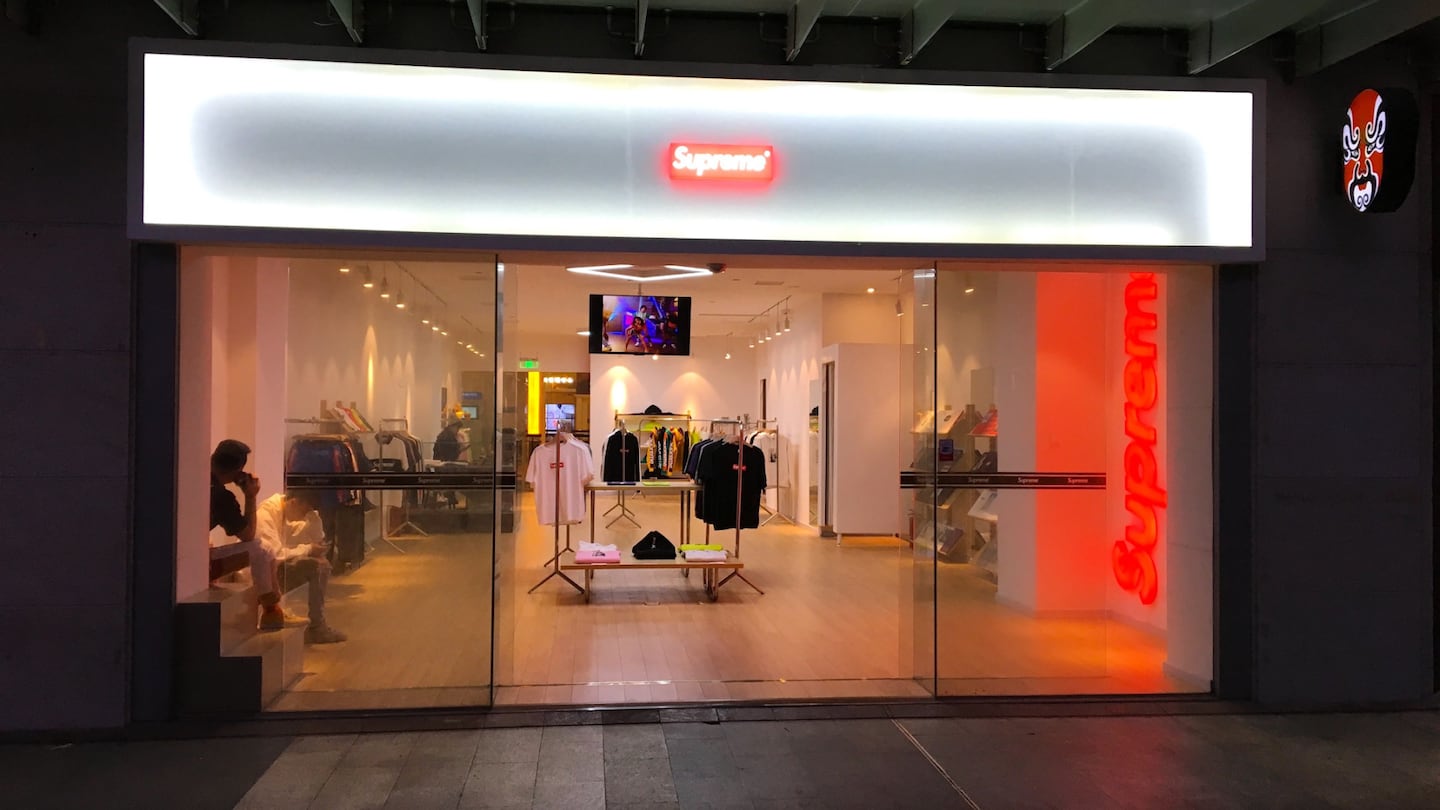
The Business of Fashion
Agenda-setting intelligence, analysis and advice for the global fashion community.

Agenda-setting intelligence, analysis and advice for the global fashion community.

This summer, newly appointed VF Corp. chief executive Bracken Darrell told investors he would move to turn around the company’s slumping portfolio of brands, including Vans, Supreme and Timberland, with “a sense of urgency.”
For some investors, that’s not fast enough.
Earlier this week, investment fund Legion Partners Asset Management acquired a stake in the Denver-based brand manager, calling for VF to sell off poorly performing labels such as Timberland, according to a Bloomberg report. They were the second activist to zero in on the company this month, on the heels of Engaged Capital, which on Oct. 17 confirmed its position in the company at a hedge fund conference.
Like Legion Partners, Engaged Capital is urging the VF Corp. to explore “non-core divestitures,” a category analysts say could mean any brand except the company’s two biggest, Vans and The North Face. The fund is also advocating for management to cut costs, use cash flow to pay down debt and replace some board members.
ADVERTISEMENT
Activist investors ostensibly have the same goals as corporate executives – maximise shareholder value – but are seldom welcome in the boardroom. Oftentimes, they’ll push for difficult decisions such as new leadership or layoffs, or even for a company to be broken up or sold.
For the most part, analysts agree that something needs to change at VF Corp., whether that comes from an activist investor or the c-suite. The company’s growth has stalled, as three of its four biggest brands – Vans, Timberland and Dickies – saw their revenue decline in the fiscal year ending in March 2023 (strong sales at The North Face helped offset the drop). The $2 billion acquisition of Supreme in 2020 has so far failed to pay off, with the streetwear brand missing growth targets. Shares recently hit a 14-year low.
“Quite honestly, what they’re asking of VF is not unreasonable,” said Neil Saunders, managing director at GlobalData. “Cutting costs and streamlining operations are what VF should be doing anyway.”
Legion Partners and Engaged Capital are in a class of investment firms that put on high-pressure, outsider campaigns to make changes at publicly traded companies. Their efforts typically kick off with the disclosure of a large stake in a company – typically in the low single digit percentages, below the threshold that would trigger anti-takeover measures.
These investors then campaign publicly for their agenda, hoping to win over other shareholders and ratchet up pressure on corporate leadership. Sometimes, managers quickly agree to implement some or all of an activist’s wishlist. But fights can turn nasty, with back-and-forth attacks in the business press, regulatory filings and even on social media. The endgame can be a showdown where shareholders vote on duelling slates of board members.
These confrontations can be long and acrimonious, with plenty of twists and turns.
Macellum Advisors purchased a 5 percent stake in Kohl’s in March 2022, waging a more than year-long battle to replace the department store’s board. The hedge fund enlisted other activist funds, including Legion Partners, calling out Kohl’s for its poor retail execution that has led to years of declining sales and profits.
Macellum won two board seats, and the company agreed to boost a share buyback plan. But the fight continued: a new group of additional activist investors piled on the retailer, pushing it to consider a sale and threatening a hostile takeover. Kohl’s fended off these efforts.
ADVERTISEMENT
In the end, Kohl’s chairman of the board remained in his seat, while chief executive Michelle Gass exited the company late last year to become president and successor to Levi’s CEO. Kohl’s shares trade at about one-third their price before Macellum disclosed its initial stake.
Sometimes companies welcome activist investors, if not quite with open arms. In 2019, Barington Capital fired off a letter laying out the many challenges facing Victoria’s Secret and calling for the breakup of parent L Brands. The company resisted that last step for a while, but implemented some of the fund’s suggestions and hired it on as an adviser. Victoria’s Secret was spun off in 2021. Barington went on to push for changes at Chico’s that same year, and in August, Hanesbrands.
The investors’ arrival shouldn’t come as a surprise, said Lee Peterson, a retail consultant at WD Partners.
“Their stock is down 35 percent since last year, and divesting from one or a few of their 12 brands is just low-hanging fruit,” Peterson said. “It was smart for Engaged and Legion to go after VF.”
The company’s main problem is that its portfolio lacks focus: its 12 brands include the streetwear label Supreme, skater brand Vans, outdoors brands Timberland and The North Face, the workwear line Dickies and Jansport, which makes backpacks.
Supreme, in particular, has been a disappointment since VF acquired it for north of $2 billion three years ago. In the 12 months ending March 2023, Supreme posted revenue of $523 million — a 7 percent decline from $561.5 million the year prior. The group as a whole saw sales dip 2 percent to $11.6 billion in the same period.
“We’re not seeing VF’s acquisition strategy work as well as it once did,” Saunders said. “Divesting some of its brands would be sensible because it allows the company to focus on areas of best growth.”
This activist fight is at least starting out relatively civil.
ADVERTISEMENT
“We value the views of our shareholders and seek to maintain an open dialogue with the investment community,” the company said in a statement. “VF’s Board and leadership team, including our recently appointed CEO Bracken Darrell, are taking immediate and decisive actions to strengthen the company’s position and return VF to strong, sustainable, and profitable growth in the interests of all our shareholders.”
VF Corp. had already made some attempts to reverse its recent downward trajectory, including hiring Darrell in June after Steve Rendle unexpectedly stepped down from the CEO role late last year. Engaged Capital praised Darrell’s appointment in its critique of the business, noting his success at restructuring the computer accessories maker Logitech.
On Monday, VF Corp. announced it has tapped former Nike executive Trevor Edwards to be a new board member. It also announced earlier this year that it will be selling its backpacks division, which includes Kipling and Eastpak in addition to JanSport.
VF Corp. and its activist investors seem to be aligned on reducing debt, which chief financial officer Matt Puckett has cited as the company’s number one financial priority. In the August earnings call, Puckett said VF will use any excess free cash flow to reduce debt and is making progress on the goal of reducing its gross leverage of four times to 2.5 times.
Next week, as part of VF Corp.’s second quarter earnings report, Darrell will share his perspective on the company for the first time; he’s also likely to chart out a recovery plan for the retailer’s stagnant brands.
“I would venture to say the VF Corp. guys are looking at what these activist investors are pushing for and saying, ‘Well, that’s not such a bad idea,’” said Peterson.
After years of flat sales, the VF Corp.-owned shoemaker is looking to clarify its sometimes muddled image with consumers. On deck: product innovation, buzzy collaborations and more apparel.
For 15 years, the canvas sneaker giant rode a wave of teen demand for its classic styles, only to find itself on the outs when customers moved on to more innovative footwear. Will its new products drive growth again?

Cathaleen Chen is Retail Correspondent at The Business of Fashion. She is based in New York and drives BoF’s coverage of the retail and direct-to-consumer sectors.
Nordstrom, Tod’s and L’Occitane are all pushing for privatisation. Ultimately, their fate will not be determined by whether they are under the scrutiny of public investors.
The company is in talks with potential investors after filing for insolvency in Europe and closing its US stores. Insiders say efforts to restore the brand to its 1980s heyday clashed with its owners’ desire to quickly juice sales in order to attract a buyer.
The humble trainer, once the reserve of football fans, Britpop kids and the odd skateboarder, has become as ubiquitous as battered Converse All Stars in the 00s indie sleaze years.
Manhattanites had little love for the $25 billion megaproject when it opened five years ago (the pandemic lockdowns didn't help, either). But a constantly shifting mix of stores, restaurants and experiences is now drawing large numbers of both locals and tourists.